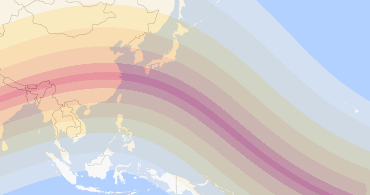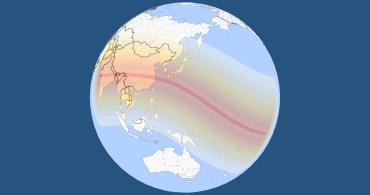Millions of people in India, China, and other parts of Asia witness a total solar eclipse on July 22, 2009. Cities such as Surat, in India, as well as Chengdu, Shanghai, and Wuhan, in China, experience the eclipse’s totality. Visitors at the Taj Mahal, which is listed as one of the modern world’s seven wonders, witness this eclipse.
This is the longest total solar eclipse in the 21st century, and will not be surpassed in duration until June 13, 2132. The moon's umbra travels along a track that is about 15,150km (about 9414 miles) long and covers 0.71 percent of the Earth’s surface area over a course of three hours and 25 minutes. The eclipse’s maximum duration of totality is six minutes and 39 seconds.
This eclipse wasn't visible in Columbus - Which upcoming eclipses can be seen in your location?
Where the Eclipse Was Seen
Try our new interactive eclipse maps. Zoom in and search for accurate eclipse times and visualizations for any location.
Path of the Eclipse Shadow
Regions that saw, at least, a partial eclipse: Asia, North in Australia, Pacific, Indian Ocean.
The eclipse's path
According to NASA, the path of the moon's umbral shadow begins in India and crosses through Nepal, Bangladesh, Bhutan and China before curving south across the Pacific Ocean. A partial eclipse is seen within the much broader path of the moon's penumbral (partially shaded outer region) shadow, which includes most of eastern Asia, Indonesia, and the Pacific Ocean.
This eclipse wasn't visible in Columbus - Which upcoming eclipses can be seen in your location?
Eclipse Shadow Path
0%
>0%
40%
90%
100%
The dark areas symbolize night and twilight.
When the Eclipse Happened Worldwide — Timeline
The eclipse started at one location and ended at another. The times below are actual times (in UTC) when the eclipse occurred. This calculation uses a Delta T value of 66.0 seconds.
| Eclipse Stages Worldwide | UTC Time | Local Time in Columbus* |
|---|---|---|
| First location to see the partial eclipse begin | Jul 21 at 23:58:17 | Jul 21 at 7:58:17 pm |
| First location to see the full eclipse begin | Jul 22 at 00:51:16 | Jul 21 at 8:51:16 pm |
| Maximum Eclipse | Jul 22 at 02:35:18 | Jul 21 at 10:35:18 pm |
| Last location to see the full eclipse end | Jul 22 at 04:19:23 | Jul 22 at 12:19:23 am |
| Last location to see the partial eclipse end | Jul 22 at 05:12:21 | Jul 22 at 1:12:21 am |
* These local times do not refer to a specific location but indicate the beginning, peak, and end of the eclipse on a global scale, each line referring to a different location. This eclipse isn't visible in Columbus.
Upcoming eclipses visible in Columbus
Next Total Solar Eclipse will be on Jul 11, 2010
Eclipse calculations usually accurate to a few seconds
Countries Where the Eclipse Is Visible
| Country | Type | Start of Eclipse | End of Eclipse |
|---|---|---|---|
| Bangladesh | Total Solar Eclipse | 6:58 am | 9:06 am |
| Bhutan | Total Solar Eclipse | 6:00 am BTT | 8:07 am BTT |
| China | Total Solar Eclipse | 8:00 am CST | 11:04 am CST |
| India | Total Solar Eclipse | 5:28 am IST | 7:44 am IST |
| Japan | Total Solar Eclipse | 9:25 am JST | 1:12 pm JST |
| Kiribati | Total Solar Eclipse | 2:42 pm GILT | 6:09 pm PHOT |
| Marshall Islands | Total Solar Eclipse | 2:15 pm | 4:56 pm |
| Myanmar | Total Solar Eclipse | 6:29 am MMT | 8:47 am MMT |
| Nepal | Total Solar Eclipse | 5:45 am NPT | 7:48 am NPT |
| Afghanistan | Partial Solar Eclipse | 4:44 am AFT | 6:24 am AFT |
| American Samoa | Partial Solar Eclipse | 4:15 pm SST | 6:11 pm SST |
| Australia | Partial Solar Eclipse | 12:49 pm PGT | 2:10 pm AEST |
| Azerbaijan | Partial Solar Eclipse | 6:28 am AZST | 6:43 am AZST |
| British Indian Ocean Territory | Partial Solar Eclipse | 7:23 am IOT | 7:27 am IOT |
| Brunei | Partial Solar Eclipse | 8:47 am BNT | 10:23 am BNT |
| Cambodia | Partial Solar Eclipse | 7:08 am ICT | 9:23 am ICT |
| Cook Islands | Partial Solar Eclipse | 5:17 pm CKT | 6:57 pm CKT |
| Fiji | Partial Solar Eclipse | 3:09 pm FJT | 5:10 pm FJT |
| French Polynesia | Partial Solar Eclipse | 5:23 pm TAHT | 6:03 pm TAHT |
| Guam | Partial Solar Eclipse | 11:25 am ChST | 2:15 pm ChST |
| Hong Kong | Partial Solar Eclipse | 8:14 am HKT | 10:46 am HKT |
| Indonesia | Partial Solar Eclipse | 7:13 am WIB | 1:04 pm WIT |
| Iran | Partial Solar Eclipse | 5:23 am IRDT | 6:18 am IRDT |
| Kazakhstan | Partial Solar Eclipse | 6:20 am ALMT | 8:01 am ALMT |
| Kyrgyzstan | Partial Solar Eclipse | 6:18 am KGT | 7:57 am KGT |
| Laos | Partial Solar Eclipse | 7:02 am ICT | 9:25 am ICT |
| Macau | Partial Solar Eclipse | 8:13 am CST | 10:44 am CST |
| Malaysia | Partial Solar Eclipse | 8:17 am MYT | 10:39 am MYT |
| Maldives | Partial Solar Eclipse | 6:00 am MVT | 6:41 am MVT |
| Micronesia | Partial Solar Eclipse | 11:20 am CHUT | 3:51 pm KOST |
| Mongolia | Partial Solar Eclipse | 7:19 am HOVT | 10:41 am ULAT |
| Nauru | Partial Solar Eclipse | 2:39 pm NRT | 5:00 pm NRT |
| New Caledonia | Partial Solar Eclipse | 2:20 pm NCT | 3:58 pm NCT |
| New Zealand | Partial Solar Eclipse | 3:36 pm NZST | 4:57 pm NZST |
| Niue | Partial Solar Eclipse | 4:22 pm NUT | 6:00 pm NUT |
| Norfolk Island | Partial Solar Eclipse | 3:19 pm NFT | 4:03 pm NFT |
| North Korea | Partial Solar Eclipse | 9:32 am KST | 12:06 pm KST |
| Northern Mariana Islands | Partial Solar Eclipse | 11:13 am ChST | 2:15 pm ChST |
| Oman | Partial Solar Eclipse | 5:29 am GST | 5:47 am GST |
| Pakistan | Partial Solar Eclipse | 6:07 am | 7:56 am |
| Palau | Partial Solar Eclipse | 10:17 am | 12:48 pm |
| Papua New Guinea | Partial Solar Eclipse | 12:09 pm PGT | 2:47 pm PGT |
| Philippines | Partial Solar Eclipse | 8:26 am | 11:16 am |
| Russia | Partial Solar Eclipse | 7:32 am | 3:19 pm MAGST |
| Samoa | Partial Solar Eclipse | 4:16 pm WST | 6:12 pm WST |
| Singapore | Partial Solar Eclipse | 8:39 am SGT | 9:44 am SGT |
| Solomon Islands | Partial Solar Eclipse | 1:40 pm SBT | 4:04 pm SBT |
| South Korea | Partial Solar Eclipse | 9:29 am KST | 12:14 pm JST |
| Sri Lanka | Partial Solar Eclipse | 5:54 am IST | 7:15 am IST |
| Taiwan | Partial Solar Eclipse | 8:18 am CST | 11:06 am CST |
| Tajikistan | Partial Solar Eclipse | 5:14 am TJT | 6:54 am TJT |
| Thailand | Partial Solar Eclipse | 7:01 am ICT | 9:20 am ICT |
| Tokelau | Partial Solar Eclipse | 4:12 pm TKT | 6:11 pm TKT |
| Tonga | Partial Solar Eclipse | 4:17 pm TOT | 6:11 pm TOT |
| Turkmenistan | Partial Solar Eclipse | 5:28 am TMT | 6:49 am TMT |
| Tuvalu | Partial Solar Eclipse | 2:58 pm TVT | 5:10 pm TVT |
| US Minor Outlying Islands | Partial Solar Eclipse | 2:08 pm WAKT | 6:04 pm SST |
| United Arab Emirates | Partial Solar Eclipse | 5:38 am GST | 5:47 am GST |
| United States | Partial Solar Eclipse | 4:39 pm HST | 6:19 pm HST |
| Uzbekistan | Partial Solar Eclipse | 6:20 am KGT | 6:52 am UZT |
| Vanuatu | Partial Solar Eclipse | 2:03 pm VUT | 4:02 pm VUT |
| Vietnam | Partial Solar Eclipse | 7:03 am ICT | 9:30 am ICT |
| Wallis and Futuna | Partial Solar Eclipse | 3:14 pm WFT | 5:12 pm WFT |
All times shown in this table are local time. (Note: more than one time zone is listed.)
How Many People Can See This Eclipse?
| Number of People Seeing... | Number of People* | Fraction of World Population |
|---|---|---|
| Any part of the eclipse | 3,360,000,000 | 48.75% |
| At least 10% partial | 3,240,000,000 | 46.97% |
| At least 20% partial | 3,180,000,000 | 46.13% |
| At least 30% partial | 3,100,000,000 | 44.99% |
| At least 40% partial | 2,960,000,000 | 43.02% |
| At least 50% partial | 2,830,000,000 | 41.13% |
| At least 60% partial | 2,650,000,000 | 38.45% |
| At least 70% partial | 2,310,000,000 | 33.60% |
| At least 80% partial | 1,840,000,000 | 26.73% |
| At least 90% partial | 1,260,000,000 | 18.33% |
| Totality or annularity | 421,000,000 | 6.12% |
* The number of people refers to the resident population (as a round number) in areas where the eclipse is visible. timeanddate has calculated these numbers using raw population data provided by the Center for International Earth Science Information Network (CIESIN) at Columbia University. The raw data is based on population estimates from the year 2000 to 2020.

An Eclipse Never Comes Alone!
A solar eclipse always occurs about two weeks before or after a lunar eclipse.
Usually, there are two eclipses in a row, but other times, there are three during the same eclipse season.
This is the second eclipse this season.
First eclipse this season: July 7, 2009 — Penumbral Lunar Eclipse
Third eclipse this season: August 5–6, 2009 — Penumbral Lunar Eclipse

